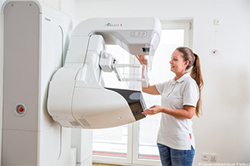New center for women with hereditary breast or ovarian cancer

The Medical Center – University of Freiburg now belongs to the German Consortium for Hereditary Breast and Ovarian Cancer. Those affected receive the entire spectrum of preventive care, advice and treatment from a single source.If the women in a family have a high incidence of breast or ovarian cancers, or contract them when quite young, a hereditary predisposition may lie behind it. In order to recognize this at an early stage, and to be able to comprehensively help those affected, the Medical Center – University of Freiburg has now been accepted into the German Consortium for Hereditary Breast and Ovarian Cancer. Those from affected families who seek help will receive the entire spectrum of genetic, gynecological and radiological diagnostics as well as comprehensive interdisciplinary consultation and treatment.
"At the Medical Center – University of Freiburg we are in the fortunate position of being able to offer all established diagnostic, preventive and treatment procedures from a single source," says Prof. Dr. Judith Fischer, the center's spokeswoman and Medical Director of the Institute for Human Genetics of the Medical Center – University of Freiburg. These include gene sequencing of the highest scientific standard, MRI imaging and – following surgery – the full spectrum of breast reconstruction. In Freiburg, the latter can be carried out in part using the patient's own tissue.
The first points of contact for affected women and families are the Institute for Human Genetics and the Breast Center Freiburg. In addition, experts from the Departments of Obstetrics and Gynecology, Radiology, Plastic Surgery, and Psychosomatic Medicine and Psychotherapy of the Medical Center – University of Freiburg are significantly involved with the new center.
The American actress Angelina Jolie is probably the best-known person affected in the world. In 2013, a variant of the BRCA1 gene was detected in her, which significantly increases breast cancer risk. Subsequently, she had her mammary gland tissue removed preventively on both sides, and the breasts restored with silicone. "Such a radical step is by no means always necessary. We discuss in detail, both in the interdisciplinary team and with those affected, what is medically reasonable and necessary. The decision then lies with the patient," says Prof. Fischer.
Back